What Grandma Did (Not…)
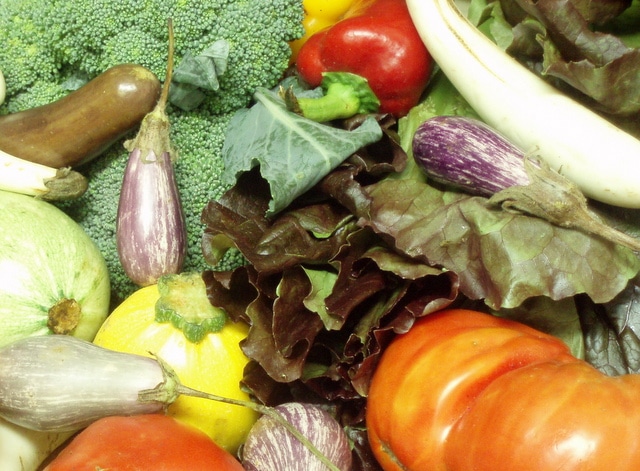 A few years back, I was part of a conversation that included a friend who was trying to both increase the fresh food (especially vegetables) she ate and decrease her carbon footprint – by eliminating plastic, making fewer trips to the supermarket, shopping at the Saturday farmer’s market… And, of course, eliminating waste, especially food waste.
A few years back, I was part of a conversation that included a friend who was trying to both increase the fresh food (especially vegetables) she ate and decrease her carbon footprint – by eliminating plastic, making fewer trips to the supermarket, shopping at the Saturday farmer’s market… And, of course, eliminating waste, especially food waste.
Worthy goals, all, but she was finding it difficult. She’d buy good food but it would wilt or go bad, and she’d feel guilty. Finally she said “It can’t be impossible! After all, Grandma did it!”
And I thought… did she? Did she really do what we are trying to do? Because, really, our lives, and expectations, have changed.
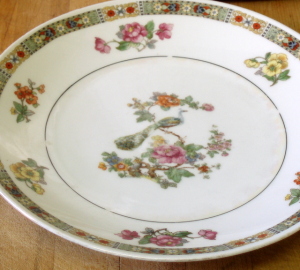 I have always been interested in social and cultural history, including the history of food and cooking, and the stories from my own family. I actually lived with one grandmother for a few years when I was a young adult. I have a fine collection of cookbooks that belonged to my grandmothers dating back to the end of the 19th century. (Generations run long in my family – and Granny had library discards published long before she started keeping house herself.) And I’ve listened to stories about more distant relatives living on farms in the early to mid 20th century, though my own parents grew up in cities.
I have always been interested in social and cultural history, including the history of food and cooking, and the stories from my own family. I actually lived with one grandmother for a few years when I was a young adult. I have a fine collection of cookbooks that belonged to my grandmothers dating back to the end of the 19th century. (Generations run long in my family – and Granny had library discards published long before she started keeping house herself.) And I’ve listened to stories about more distant relatives living on farms in the early to mid 20th century, though my own parents grew up in cities.
These women’s lives were very different from each other’s, as well as from mine, and they had very different ways of shopping and cooking. And I learned many, though not all, of the ways they dealt with food – none of which is quite what we expect to accomplish today.
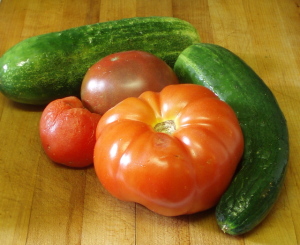 I’ll start with Jane, the oldest, who married a farmer in the late 19th Century. She’s the closest I have to the image we have of the archetypal Rural Grandma. They ran a dairy farm, and while the men cared for cows and brought in hay, she spent her life around food – growing and canning vegetables, skimming cream and churning butter, raising and slaughtering chickens… feeding a large family (and occasional hired men.) They didn’t have electricity until Rural Electrification in the Thirties, I’m not sure she ever had a refrigerator (though there was eventually an icebox.) She ate beautiful fresh vegetables out of her garden – in the summer. Each day in season they ate part of what she’d picked that morning – she wasn’t holding a head of lettuce for a week, as a big farm family would go through that fast. But she canned most of her produce… her granddaughter told me about watching in sorrow as beautiful fresh beefsteak tomatoes were cooked down for canning. If Jane hadn’t canned they would have had no vegetables at all during the winter and spring. She never kept a week’s worth of vegetables fresh. Everything was either eaten or canned immediately.
I’ll start with Jane, the oldest, who married a farmer in the late 19th Century. She’s the closest I have to the image we have of the archetypal Rural Grandma. They ran a dairy farm, and while the men cared for cows and brought in hay, she spent her life around food – growing and canning vegetables, skimming cream and churning butter, raising and slaughtering chickens… feeding a large family (and occasional hired men.) They didn’t have electricity until Rural Electrification in the Thirties, I’m not sure she ever had a refrigerator (though there was eventually an icebox.) She ate beautiful fresh vegetables out of her garden – in the summer. Each day in season they ate part of what she’d picked that morning – she wasn’t holding a head of lettuce for a week, as a big farm family would go through that fast. But she canned most of her produce… her granddaughter told me about watching in sorrow as beautiful fresh beefsteak tomatoes were cooked down for canning. If Jane hadn’t canned they would have had no vegetables at all during the winter and spring. She never kept a week’s worth of vegetables fresh. Everything was either eaten or canned immediately.
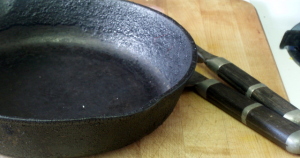 Madeleine, 50 years younger and in a different branch of the family, grew up on a farm… but a smaller tenant farm, not one her family owned. I don’t know much about it, other than that her mother also grew and canned at least some of her vegetables. She told me that they went into town once a week, on Saturday, to do business, including shopping. They did not have their own dairy or meat, as Jane did. Her mother would buy chops for that night, and a roast or a chicken for Sunday – and that was all the meat for the week. The roast lasted as long as it lasted… and then they ate canned beans and a few eggs with their fresh or canned vegetables. So she, like many of us, did do a weekly shopping, but expected her menu to be much more limited on Thursday and Friday than it had been on Saturday and Sunday.
Madeleine, 50 years younger and in a different branch of the family, grew up on a farm… but a smaller tenant farm, not one her family owned. I don’t know much about it, other than that her mother also grew and canned at least some of her vegetables. She told me that they went into town once a week, on Saturday, to do business, including shopping. They did not have their own dairy or meat, as Jane did. Her mother would buy chops for that night, and a roast or a chicken for Sunday – and that was all the meat for the week. The roast lasted as long as it lasted… and then they ate canned beans and a few eggs with their fresh or canned vegetables. So she, like many of us, did do a weekly shopping, but expected her menu to be much more limited on Thursday and Friday than it had been on Saturday and Sunday.
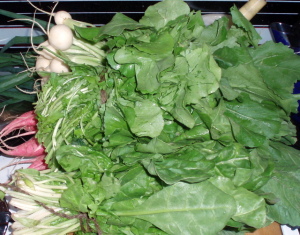 Helen, in the generation between them, lived a very different life in the city. She never canned a vegetable in her life. Unlike the rural women, though, she shopped every day. She would get meat at the butcher’s, and cook it that night, she bought bread fresh every day, milk was delivered every morning. (Madeleine’s mother had a milkman, too – Jane’s husband delivered the milk from his cows to the neighborhood.) She did expect fresh lettuce most of the year (which the farm women did not have) and a head did have to last a couple of days in the icebox (later, refrigerator) but she was feeding four people, and, well, wasn’t iceberg lettuce wonderful? It stays nice and crisp! There was often a cabbage, or some carrots. A bag of potatoes and some onions went into a root cellar drawer, and she expected them to last a while. Otherwise, they ate almost all canned vegetables. She managed her kitchen differently, but still did not expect most produce to last a week or longer.
Helen, in the generation between them, lived a very different life in the city. She never canned a vegetable in her life. Unlike the rural women, though, she shopped every day. She would get meat at the butcher’s, and cook it that night, she bought bread fresh every day, milk was delivered every morning. (Madeleine’s mother had a milkman, too – Jane’s husband delivered the milk from his cows to the neighborhood.) She did expect fresh lettuce most of the year (which the farm women did not have) and a head did have to last a couple of days in the icebox (later, refrigerator) but she was feeding four people, and, well, wasn’t iceberg lettuce wonderful? It stays nice and crisp! There was often a cabbage, or some carrots. A bag of potatoes and some onions went into a root cellar drawer, and she expected them to last a while. Otherwise, they ate almost all canned vegetables. She managed her kitchen differently, but still did not expect most produce to last a week or longer.
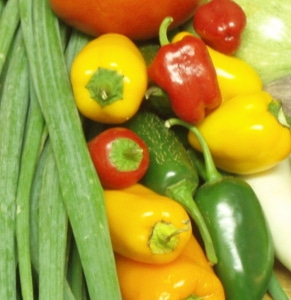 Returning to my friend… She is single, and working in a fascinating, challenging field that takes time and attention. She buys much of her food in a large, well-stocked supermarket — which takes time to drive to and time to shop in, so she’s trying to cut back to shopping on alternate weeks. There is a farmer’s market, but only once a week (and, of course, she has to drive to that, too…)
Returning to my friend… She is single, and working in a fascinating, challenging field that takes time and attention. She buys much of her food in a large, well-stocked supermarket — which takes time to drive to and time to shop in, so she’s trying to cut back to shopping on alternate weeks. There is a farmer’s market, but only once a week (and, of course, she has to drive to that, too…)
And so, the biggest changes from Grandma’s day – she buys a week’s worth of food at once, instead of harvesting or shopping daily, she lives alone, so is trying to finish that cut bell pepper before it gets soft, and she expects fresh, not canned, vegetables all year. She does have a refrigerator and a freezer, she does not have a milkman or her own kitchen garden. On the whole, she has more ways to keep food fresh, but she also expects to keep it fresh longer.
I’m not trying to discourage her from eating this way. If anything, my entire blog is trying to encourage it. But I think we need to be realistic…
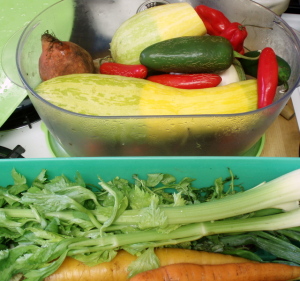 Our grandmothers did not think of themselves as compromising, when they ate canned peas in January – they saw it as a victory that they had vegetables at all. (Of course the peas weren’t as good as fresh – but they didn’t expect them to be.) We, though, need to look at the many (sometimes conflicting) things we can do, and decide for ourselves what is most important, and how we want to manage.
Our grandmothers did not think of themselves as compromising, when they ate canned peas in January – they saw it as a victory that they had vegetables at all. (Of course the peas weren’t as good as fresh – but they didn’t expect them to be.) We, though, need to look at the many (sometimes conflicting) things we can do, and decide for ourselves what is most important, and how we want to manage.
I get as much fresh and local produce as I feel that I reasonably can. Six months of the year, we are in a CSA – and I do get enough from that to do a little preservation for winter. I’m certainly not doing the canning Jane did… for me, that doesn’t make sense (though there are people, even in urban apartments, who feel that it does for them) and I don’t want even home canned peas anyway… But I freeze cooked greens, and chopped hot peppers, and sauteed celery. I make some fermented pickles (not many – Rich doesn’t really like pickles – but some, because I do.) I freeze ratatouille base.
 Meanwhile, I have a couple of containers that help keep vegetables fresh longer. They are sealed to keep a moist environment, but have grids or drains on the bottom to let water drip out, so nothing sits in it. These are plastic, but I believe that some glass ones are starting to turn up in stores. The key is the balance between humidity and damp. Many newer refrigerators come with produce drawers that themselves do a pretty good job of this, and if yours does by all means use it, but my “crisper drawer” is really closer to a root cellar – good for potatoes and cabbage, but not really for lettuce. (And I need it as a root cellar – my apartment is hot, even in winter. If I leave potatoes out, they rot.)
Meanwhile, I have a couple of containers that help keep vegetables fresh longer. They are sealed to keep a moist environment, but have grids or drains on the bottom to let water drip out, so nothing sits in it. These are plastic, but I believe that some glass ones are starting to turn up in stores. The key is the balance between humidity and damp. Many newer refrigerators come with produce drawers that themselves do a pretty good job of this, and if yours does by all means use it, but my “crisper drawer” is really closer to a root cellar – good for potatoes and cabbage, but not really for lettuce. (And I need it as a root cellar – my apartment is hot, even in winter. If I leave potatoes out, they rot.)
Every week when we get our produce, I evaluate it – what should be eaten right away (spinach, corn,) what should be eaten or processed within the week or as soon as possible after (chard, herbs, lettuce,summer squash,) and what will keep a while (I have a couple of cabbages in the crisper drawer right now – they’ll be joined soon by winter squash.)
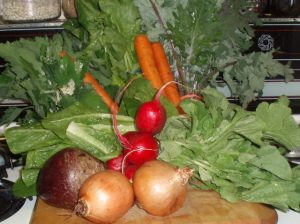 We eat mostly seasonally, and mostly locally. I am not an absolutist about either. I do everything I can to extend the life of the produce I bring home, and sometimes that means preservation. I am totally willing to buy citrus fruits and even exotics like avocados, but I recognize them as a luxury – we eat many more apples. (And I know that some of you reverse that, if you live in warmer climates.) In winter and early spring, when there is little available here, I’m delighted to be able to buy frozen vegetables – Grandma didn’t have that option, when she was young, and ate canned vegetables all winter. I, personally, right now would rather have the frozen vegetables than “fresh” ones hauled across the continent or up from the Southern hemisphere – but that’s a choice for each person, and it does depend a lot on availability in your area. (And it certainly is influenced by the poor produce section in my local supermarket – if I had better choices, I might, indeed, choose them.)
We eat mostly seasonally, and mostly locally. I am not an absolutist about either. I do everything I can to extend the life of the produce I bring home, and sometimes that means preservation. I am totally willing to buy citrus fruits and even exotics like avocados, but I recognize them as a luxury – we eat many more apples. (And I know that some of you reverse that, if you live in warmer climates.) In winter and early spring, when there is little available here, I’m delighted to be able to buy frozen vegetables – Grandma didn’t have that option, when she was young, and ate canned vegetables all winter. I, personally, right now would rather have the frozen vegetables than “fresh” ones hauled across the continent or up from the Southern hemisphere – but that’s a choice for each person, and it does depend a lot on availability in your area. (And it certainly is influenced by the poor produce section in my local supermarket – if I had better choices, I might, indeed, choose them.)
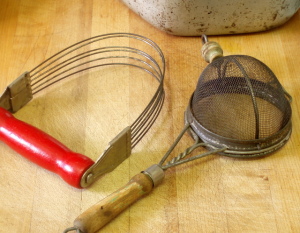 I know, though, that whatever I choose I am not doing what Jane, Madeleine’s mother, or Helen did. I have resources they did not – they had resources I do not. And I have very different expectations.
I know, though, that whatever I choose I am not doing what Jane, Madeleine’s mother, or Helen did. I have resources they did not – they had resources I do not. And I have very different expectations.
I cook for 2, not 4 (or 10!) which makes many things easier – but others harder. Some of the food I buy is fresher – but much is less fresh. I have a refrigerator with a good freezer compartment (which I stuff…) I assume that I can buy fresh produce all year around – if not from the farmer, from the grocery store – but I get a week’s worth at once, and then it has to last while only two of us eat it. I do not serve canned vegetables in winter. When I packed a lunch for one of us to take to work, I knew it could be kept cool and then heated, so I could pack salads and leftovers, and use vegetables for lunch – my father and grandfathers just carried sandwiches.
My friend cooks for one, and lives in an even colder climate than I do. Most of the year, she eats fresh produce trucked in from across the country – not at all as fresh as the vegetables her grandmother ate in summer, but also not the canned goods she ate in winter. She doesn’t always get home in time to cook much. She buys lettuce that was picked days before, and needs it to last another week or two – which her grandmother never even considered.
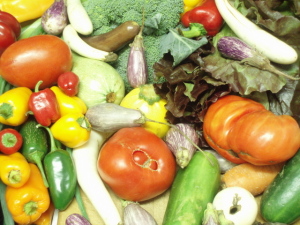 We forget how much has changed. We cannot just drop one part and expect the rest to stay the same – it’s a balancing act. And we should not criticize ourselves if we need to make further adjustments every time we move a piece – that’s the way it works. I have many more choices about what we eat, and now making those choices is, in many ways, the real work – and the real luxury.
We forget how much has changed. We cannot just drop one part and expect the rest to stay the same – it’s a balancing act. And we should not criticize ourselves if we need to make further adjustments every time we move a piece – that’s the way it works. I have many more choices about what we eat, and now making those choices is, in many ways, the real work – and the real luxury.

This is very true and is the same with thinking Grandma spent all her days cooking. My one gma had ten kids, and worked out in thr fields with her husband. Many women did this. She had to organize and be efficient. They ate dinner, not lunches and then supper, which was as much leftover dinner as was feasible…left out, not refrigerated and then reheated…eaten room temp mostly. My one older relative (born 1900) had a mother who made fried potatoes EVERY night for supper. It was a major part of the supper. Her husband asked once when the grown daughter was visiting, if they could have no potatoes the next night. His wife just snorted. That was the end of that!
A decade and a half ago I read an article debunking the farmer wife by the stove all day myth. It showed how the wives were always working toward the next few meals, while making the current one. The meals were extremely simple (my gma would make a pot of beans and theyd eat it for several meals, till gone) and everybody was fine with it, not feeling deprived. Fresh bread only happened on baking day,once a week. My one gma made biscuits daily tho, super fast becuz she was good at what she did, having made them a million times before she’d had her 2nd child. She also made an easy fried cornbread often. Rly, sliced bread and sandwiches or toast were rare. Pancakes, waffles, etc, very rare. Syrup was pricey, for one thing…
Simiplicity and doing the same thing over and over so you excelled at it were key. Our expectation level today would have been laughed at by most wives in the early to mid 1900s. Madison Avenue and Planned Parenthood have made us think extreme cooking is realistic. I like how your article contributes to showing it’s a bitter deception that we would do well to out from 🙂
Yes. Yes, yes, YES!
As I wrote, Jane spent most of her time around food – but that wasn’t cooking elaborate dinners. She kept the vegetable garden and the chickens, she canned produce, she churned butter from the milk from their cows… and then she cooked 3 meals a day for 10 (or more) people!
Some things are regional – my family was in New York and New Jersey, so home baked loaf bread was on the table, rather than biscuits and cornbread. (It has a lot to do with the flour… but that’s another whole discussion…) I have a recipe for “Mother’s Bread” from yet another branch of the family. Mother (Anna) was older than Jane, and urban, but baked multiple loaves of salt rising bread every week, back around 1900 – her daughters did not.
I think some of the extreme cooking, as you so aptly call it, came from the generation between these ladies and ours. When my younger brother started high school, my mother returned to the job market (as her mother – Helen – had before her) but Rich’s mother, like many others, did not. And from the age of, say, 45 (when her youngest started college) until her late 70s she had neither children at home nor outside employment – and she did do that sort of gourmet cooking, because she enjoyed it. And she did have the time and energy… as did others of her generation. I think we have compared what we do to what our mothers did when we were young adults – not to what they did when we were toddlers.
Others, of course, who did not enjoy cooking, took us in the other direction – frozen dinners, packets of sauce mix, and the vast amount of packaged food that began to flood the market in the 50s, and that so many people now do not know how to cook without, since that is what their mothers and grandmothers used. But all this led us to where we are now, assuming that cooking is very complex, that either you spend hours making elaborate meals or you just use a package or get takeout.
My mother enjoyed cooking, too – but had much less time and energy to devote to it. Gourmet meals were an occasional treat, but good food was a constant. I learned early to make simple delicious… I don’t have children, but I am dealing with chronic illness, and a major concept of this blog is to share methods I’ve worked out to cook dinner when you can’t cook, since that happens at least sometimes to all of us.